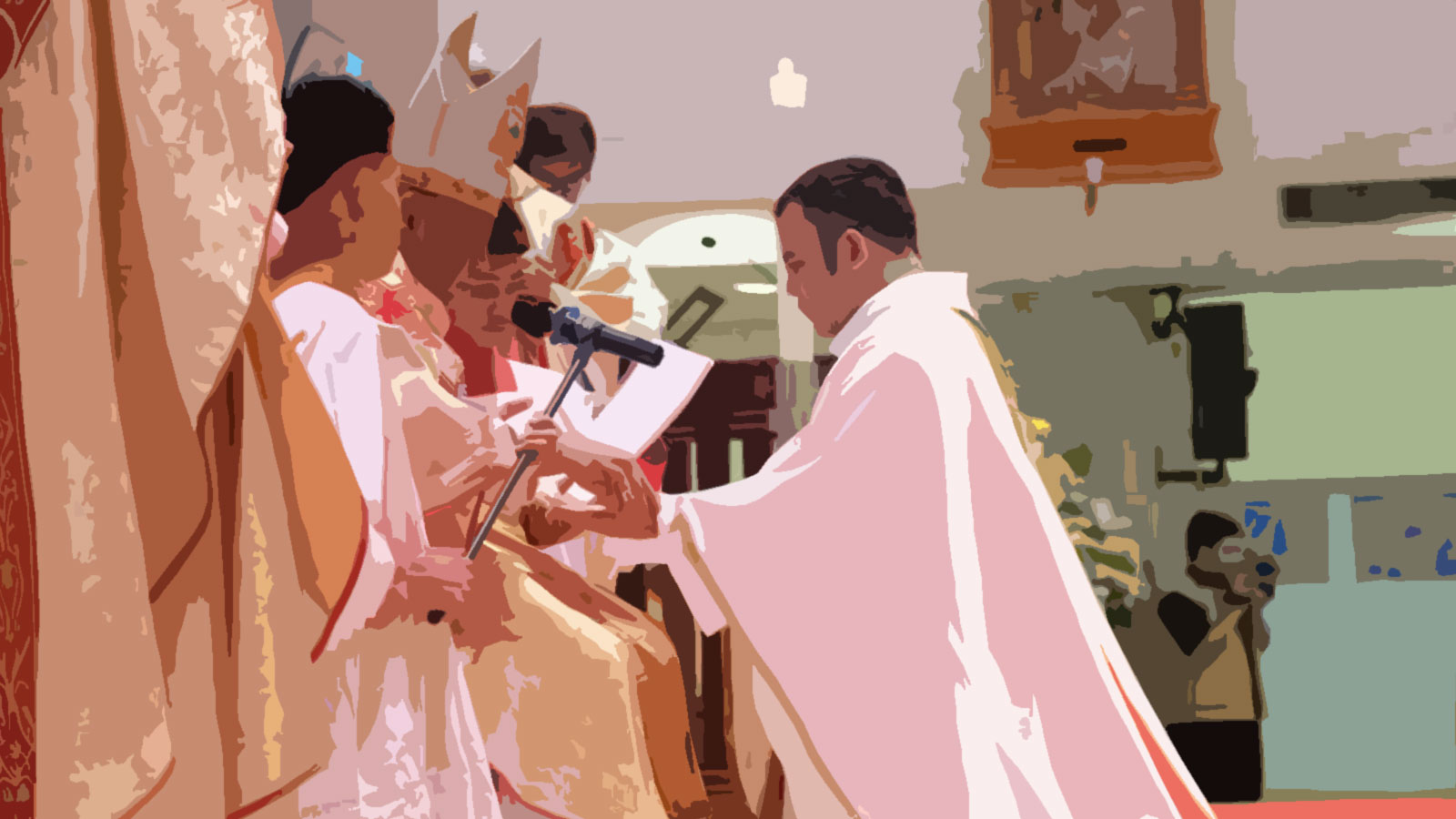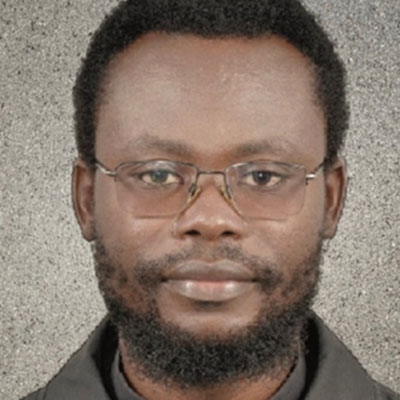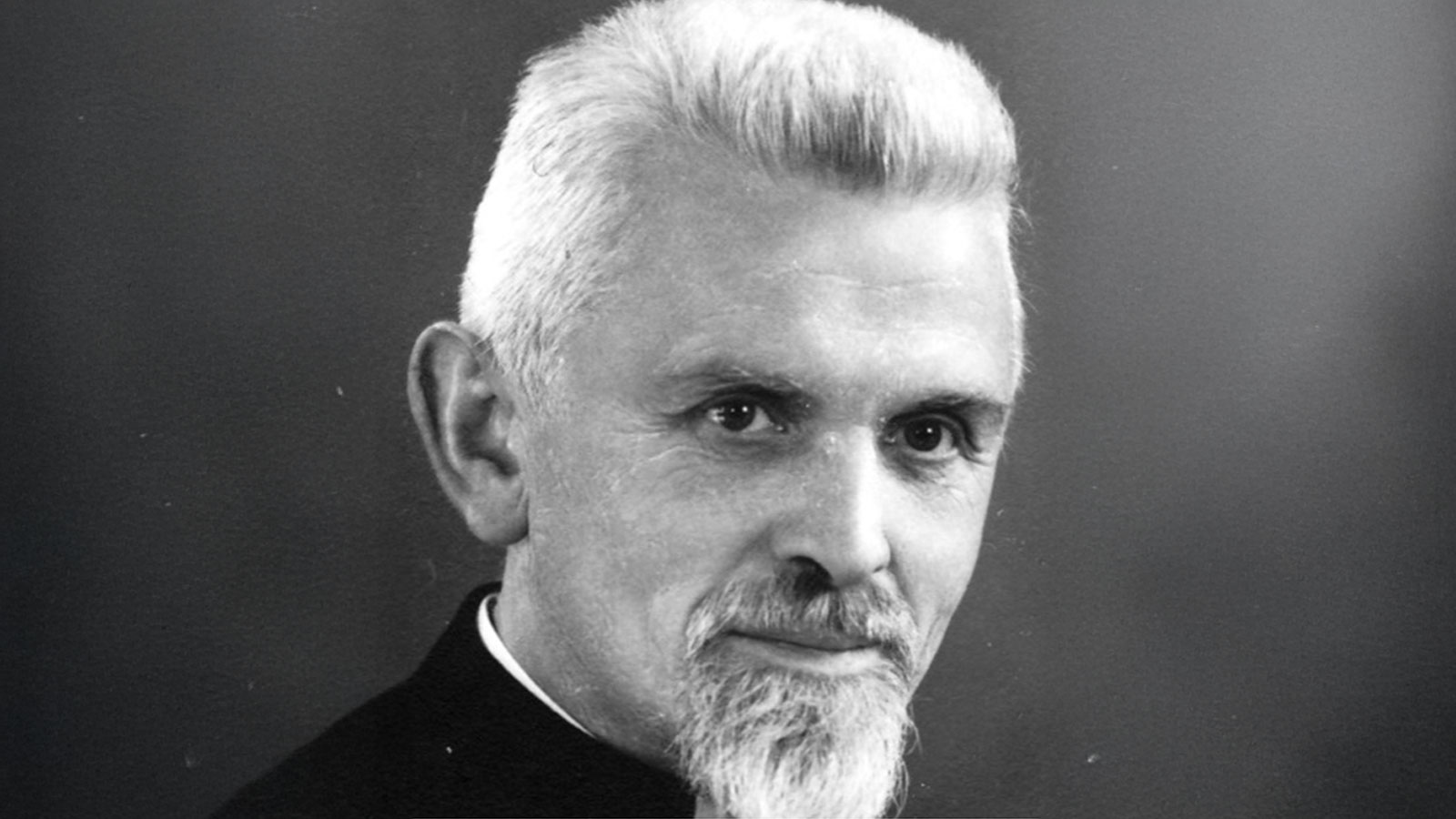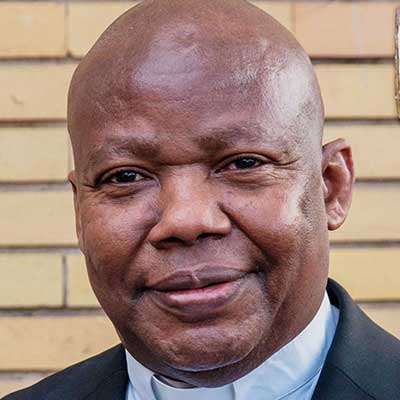 Father Charles Phukuta, cicm
Father Charles Phukuta, cicm
Superior General
A new missionary foundation must first be a missionary act, not to recruit CICM candidates. As far back as 1974, the 8th General Chapter recommended that the General Government take "the initiative of accepting new missionary tasks which will make new blood circulate in the Congregation." (Kindling the Fire, p. 131) Accepting new missionary tasks involves:
- Careful consideration of the needs,
- The alignment with our mission, and
- The potential impact.
CICM exists for the mission. Thus, we cannot meet the challenge of new foundations by simply expanding our activities. Involvement in new foundations where we are called upon means participating in the mystery of a Creator God who alone renews the face of the earth (Ps 103. 30). We participate in God's creative activity by remaining pioneers because new foundations bring new life to our Institute and to the people we are sent to. That is why new foundations cannot be the result of a vague missionary desire or the wish to be known in the history of the Institute for having founded another mission. New foundations must be based on the cornerstone of our missionary identity. They can only be built on the CICM charism.
Recent Requests
Recent requests for new CICM presence received include the Dioceses of Karonga and Mzuzu in Malawi, Ijebu-Ode in Nigeria, Gaspé in Canada, and the Archdiocese of Bangui in the Central African Republic. Other requests include Solidarity with South Sudan, a joint project between the International Union Superiors General (UISG) and the Union of Superiors General (USG), aiming to provide support and solidarity to the people of South Sudan. The US and LAC Provinces have continued to entertain the idea of reviving the plan to start a missionary presence in Cuba. The two Provinces of Asia have visited Vietnam and Papua New Guinea in view of establishing a missionary presence there. These requests and others under consideration are a sign of confidence and trust in our Congregation; they keep alive the daring spirit, which is the courage and boldness to accept new ventures in our missionary commitments. The 16th General Chapter asked that the General Government study the possibility of a missionary initiative in Italy and, for the BNL Province, the possibility of a pastoral commitment in the Netherlands.
Recent Experiments
Our role in new foundations, often called "new missions" or "new ventures," is crucial. These are not just new insertions but significant extensions of our mission beyond the territorial boundaries of countries where we are already present. It is important to note that new insertions outside the limits of a Province but in the same country are not considered new foundations and belong under the Province's responsibility for personnel and animation.
Although the requests were worthwhile in most cases, the General Government did not consider them all because of our obligation towards the local Churches where we are presently engaged and the diminution and aging of our membership. While we are still discerning on some of them, the General Government has retained only two: Malawi, with the help of Provinces and confreres who responded favorably to the General Government's appeal, and Canada, with the help of the US Province. To set up a sufficiently stable initial team, freeing confreres with missionary experience was challenging as younger confreres are often assigned to the initial formation and administration. Moreover, health problems, adaptation, or eventual disillusionment must also be considered. Another area of attention is the need for more preparation of the confreres to work in teams according to a renewed perspective to adapt and grow in our missionary work. One dimension of the new mission concept is that missionary congregations send small groups of missionaries to local Churches rather than a massive presence as we have known it and still know it in some older Provinces. They take charge of well-determined missionary tasks with the highest needs for a limited time.
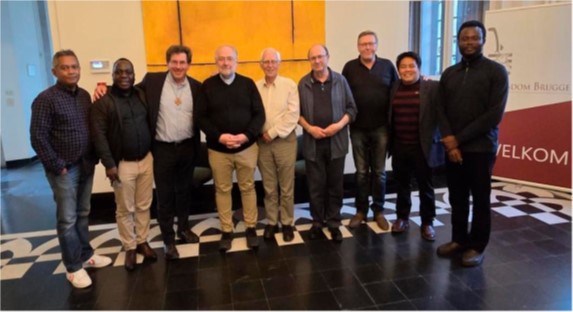
Meeting of CICM confreres with the members of the Diocesan Curia of Bruges:
Fr. Jerri Lakonawa, Fr. Martin Mvibudulu, Mgr. Lode Aerts, Piet Vandervoorde,
Fr. Luc Colla, Fr. Wilfried Meulemeester, Fr. Dominique Balleger,
Fr. Ryan Carnecer and Fr. Germain Yengo
The Future
The beginning of a new foundation is complex but also a testament to our pioneering spirit. We experience real issues about the availability and collaboration of confreres and even Major Superiors, who are protective of their personnel often for a "ministry of maintenance." When we contact a Province to ask for a confrere, the first answer is usually the Superior's objection rather than the confrere's refusal. But we do not give up. We believe that the decision to start new foundations flows from the very dynamism of our missionary charism.
Moreover, Provinces are encouraged to assess the relevance of their commitments more carefully to free up personnel for the New Foundations. Is it normal to continue to ask for personnel to manage erstwhile parishes when the diocese has plenty of diocesan priests? Our missionary presence needs to be qualitative rather than quantitative.
We are convinced that this approach positively affects the vitality of the Congregation, bringing hope and optimism for the future. Our young confreres are as entitled to be pioneers as their previous generation, and we must continue to embody this pioneering spirit, knowing that each new foundation breathes new life into our mission and our Congregation.
Father Theophile Verbist and his first companions did not think they were a multitude or a significant majority. They felt moved by the Holy Spirit in a concrete moment in history to be the hopeful presence of the Gospel for their brothers and sisters, like leaven in the mass (cf. Gal 5.9), like the salt of the earth and light of the world (Mt 5.13-14). We react positively to these new appeals, not only to remedy a shortage but because we are invited to fulfill missionary tasks: a population not yet touched by the Gospel, interreligious dialogue, and contribution to inculturation when the local Church is not yet able to do it, indigenous groups or marginalized people, and communities suffering from diverse calamities. We do not start new foundations because we cannot employ a surplus of personnel. Likewise, we would never start anything if we were to wait for such a surplus.
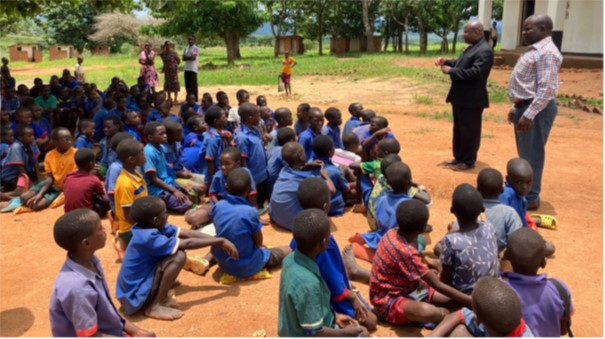
Father General Charles Phukuta in conversation with schoolchildren
In the Spirit of Mobility and Availability
Missionary work is the aim of our Institute. Confreres ordinarily receive their first assignments towards the end of their Initial Formation. Yet, an assignment to a new foundation is one of the reasons listed in our documents for transferring a confrere from one entity to another. Our orientation of ad extra and ad gentes expresses our whole missionary attitude. We are called to embody the attitude of mobility and availability. This is not just a readiness but a courageous readiness to leave comfort behind and set aside personal preferences to take up new missionary challenges.
Last year's General Chapter was about our witnessing to the Gospel in our changing, secular, and pluralistic world. Article 3 of our Constitutions reminds us to be "alert to new situations in the world as well as to new needs of the Churches. We regularly question ourselves about the tasks we undertake. We willingly adopt the reorientations deemed necessary." Indeed, the valuation of the realities of our changing world in view of the mission may dictate new orientations and challenge us to discontinue a commitment in a given place and go elsewhere where the need is more significant, and the Gospel witness is more neglected. While these orientations are not always easy, the Constitutions encourage us to willingly accept such changes in a spirit of mobility and availability.1 Mobility and availability mean being attuned to the signs of the times to serve the Church's universal mission, which demands that we go to the "peripheries" and less privileged areas outside our comfort zone. It isn't easy to convince confreres to join a new missionary venture in a challenging environment.
We often have to learn a new language and get to know another culture. We may fall ill, be hungry, or lack transportation. We may become entangled in the snares of violence and injustice. We may be called to share the Cross of Christ in many ways. God does not necessarily weave our lives in golden thread. It is about letting go of the things holding us back and focusing on the mission.
I have received letters from some of the young confreres after I approved their perpetual profession. These letters ascertain the heart of the missionary in formation. It is beautiful to see that most of our confreres in Initial Formation express their availability for the mission.
As missionaries, we must learn how to listen to God, who speaks to and calls us in all the circumstances and events of our lives. With courage and patience, we can simplify our structures and accentuate on what we are: missionaries. Being a missionary includes flexibility, mobility, adaptability, and the capability of leaving what is familiar and starting over again somewhere else, no matter how precarious. Even if our presence could be justified anywhere because our mission is everywhere, our presence does not impose itself everywhere with the same urgency. Promoting greater awareness of our corporate missionary commitment requires us to consider the good of the entire Institute in our thinking and actions. Concretely, we should cultivate a vital sense of belonging to our Congregation beyond local and provincial communities, fostering personal availability and mobility to participate in new CICM missionary projects or initiatives.
Conclusion
The characteristic features of CICM were already perceptible and experienced during our early years. Our Founder, Father Theophile Verbist, left Belgium (ad extra) to go and live among the Chinese people (ad gentes and universal fraternity) and help abandoned children (preferential option for the poor) because he was convinced that this was where his missionary presence was most needed (peripheries). As missionaries, our vocation is to be close to people, attentive to their needs, and in solidarity with them. This is a duty and a commitment to first evangelization, a mission that inspires and motivates us. Despite the challenges, new foundations have a positive value. They are necessary if the Institute is to retain its dynamism.
There is a danger of lapsing into a kind of over-reliance on predictable material resources, structures, and procedures to the exclusion of the essential divine resource, God's Providence. CICM is a work of God. Father Theophile Verbist always had a lively sense of God's involvement through providence. We are to make space for grace and keep our eyes open to invisible assistance made real in surprising disguises. This means exercising faith in the face of the anxieties and fears catalyzed by our turbulent and fast-changing world. It means setting out with courage, flexibility, and the willingness to learn and improvise rather than waiting to craft the perfect plan. So, when we accept new missionary tasks, it is to make new blood circulate in the Congregation. They are opportunities for a new beginning. §
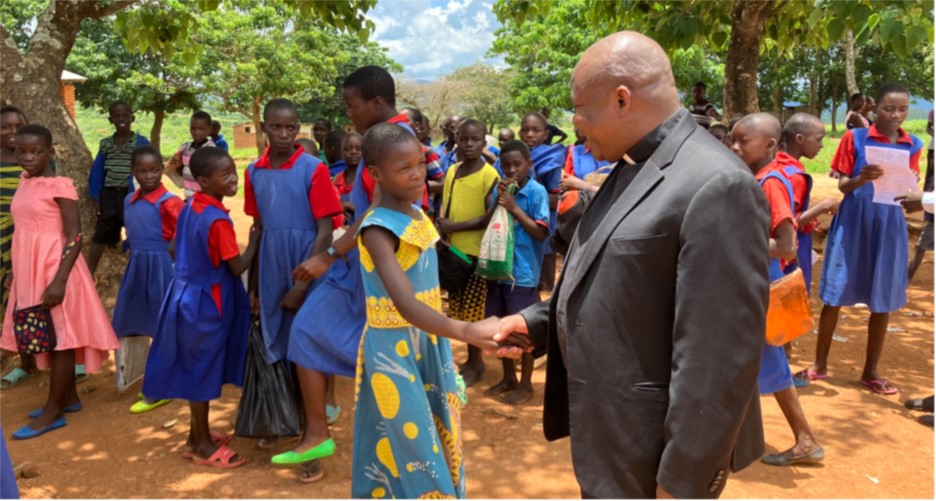
Father General Charles Phukuta meeting schoolchildren.
______________________________________________
1 Commentary of the Constitutions, p. 23






